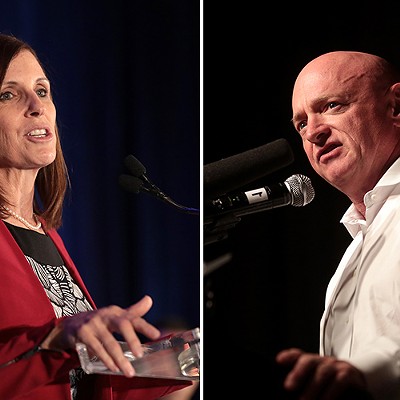Congressman Ron Barber's campaign team and his Democratic allies have been hammering away at likely Republican challenger Martha McSally over a budget proposal approved by House Republicans earlier this month.
Team Barber—along with other Democratic organizations and political committees—have pounced on the GOP budget proposal, which was authored by Congressman Paul Ryan (R-Wisc.), the party's leading budget guru and 2012 vice-presidential nominee.
Barber and other Democrats have complained that the budget proposal cuts taxes for the nation's wealthiest citizens, raises taxes on the middle class, shreds the social safety net and turns Medicare into a voucher program.
Barber, who is facing a rematch against McSally in the highly competitive Congressional District 2 in Southern Arizona, has attempted to link McSally to the Ryan budget proposal by pointing out that she said she would have voted for a similar proposal in during her 2012 campaign.
Over the weekend, for example, Barber zeroed in on the Medicare portion during a meeting with Southern Arizona seniors to discuss Medicare and the Affordable Care Act, aka Obamacare.
"Martha McSally said she would have voted for Paul Ryan's plan to make seniors pay more for health care," Barber said in a prepared statement delivered to reporters. "I voted against it—both times I had the chance to. Martha McSally also took a $5,000 campaign contribution from Paul Ryan, so there's no question that she supports his plans to balance the budget on the backs of seniors. Arizonans deserve better than someone who is willing to throw our seniors under the bus."
In a brief interview with the Weekly last week, McSally expressed some skepticism about the Medicare reform portion of the GOP budget resolution, but stopped short of saying she'd oppose the Medicare changes if elected to Congress.
The GOP budget resolution, which passed 219-205 on April 10 without a single Democratic vote, includes a push to transform Medicare from a single-payer program where health-care costs are covered by the government (with various co-pays by patients) to a system that sounds remarkably like Obamacare's healthcare insurance exchanges. Elderly Americans would be given a choice of private insurance plans on a federal exchange that would be subsidized by the federal government.
Since the federal government would be providing the subsidy directly to the insurance companies, the GOP budget resolution repeatedly stresses the proposal should not be considered a voucher plan, but Democrats still say that revamping the system to replace the current single-payer setup to one where seniors deal with private insurers is tantamount to a voucher system.
Barber has voted against the Ryan budget proposal and has said he believes that Medicare's basic structure should remain in place, with some reforms to reduce future costs.
Even though she told the media in 2012 that she would have voted for that year's version of the Ryan proposal, McSally said last week that she would not have voted to support the GOP budget resolution this year.
But she did not cite the issues surrounding changes to the Medicare program as the reason, although she said last week that she "had concerns" about changing the basic structure of Medicare.
Asked point-blank whether she'd vote to oppose those changes to Medicare, McSally sidestepped the question and instead focused on the future of the A-10 combat jet, which is slated for retirement by the Pentagon.
McSally said that because the A-10 is not included in the GOP's budget resolution, she would not have voted for it.
"I do not support any budget that does not include the A-10," said McSally, a former A-10 squadron leader who has been persistent in her criticism of Barber for being "asleep at the switch" when it came to protecting the jet's mission, especially with Davis-Monthan Air Force Base.
But the budget resolution passed by GOP lawmakers doesn't reference any specific weapons programs; it's a general statement of principles. When the Weekly pointed out to McSally that no specific weapons systems are mentioned in the document, she said simply: "There can be." Then she moved away and refused to answer any more questions.
The Weekly later asked Team McSally deputy campaign manager Kristen Douglas via email if McSally would vote against all budget resolutions until GOP leaders changed the nature of the document.
“Right now we have the opportunity to utilize the budget process to save the A-10 and if Martha was in Congress that's what she would do,” Douglas replied.
Douglas conceded that including language to save the A-10 in a budget resolution was “not common but not implausible” and noted the budget resolution did include a call to maintain at least 11 aircraft carriers.
McSally has been insistent that Barber has not done enough to preserve the A-10. She told the Pima County Republican Club last week that “Ron Barber had nothing to do” with the addition of language to a defense bill that protected the A-10’s mission through 2014.
But local leaders involved in the fight to save the A-10 have said that Barber has been engaged in the effort to save the jet's mission.
Bruce Dusenberry, a member of the Tucson Metro Chamber's Board of Directors, and Mike Grassinger of the DM50 wrote in the Arizona Daily Star that McSally was mistaken in her portrayal of Barber.
"To imply that Barber was late to the fight is simply not true," they wrote. "He was a first initiator and joined other members of the Arizona congressional delegation to help organize the Southern Arizona Defense Alliance to mobilize Tucson's community support for D-M and the 162nd Fighter Wing of the Air National Guard at Tucson International Airport."
Barber spokeswoman Ashley Nash-Hahn told the Weekly that McSally was "reckless and irresponsible" in "her unwillingness to join the bipartisan mission to save the A-10."
"This isn't about a chess move in a political campaign," Nash-Hahn said. "It's about national security."

















